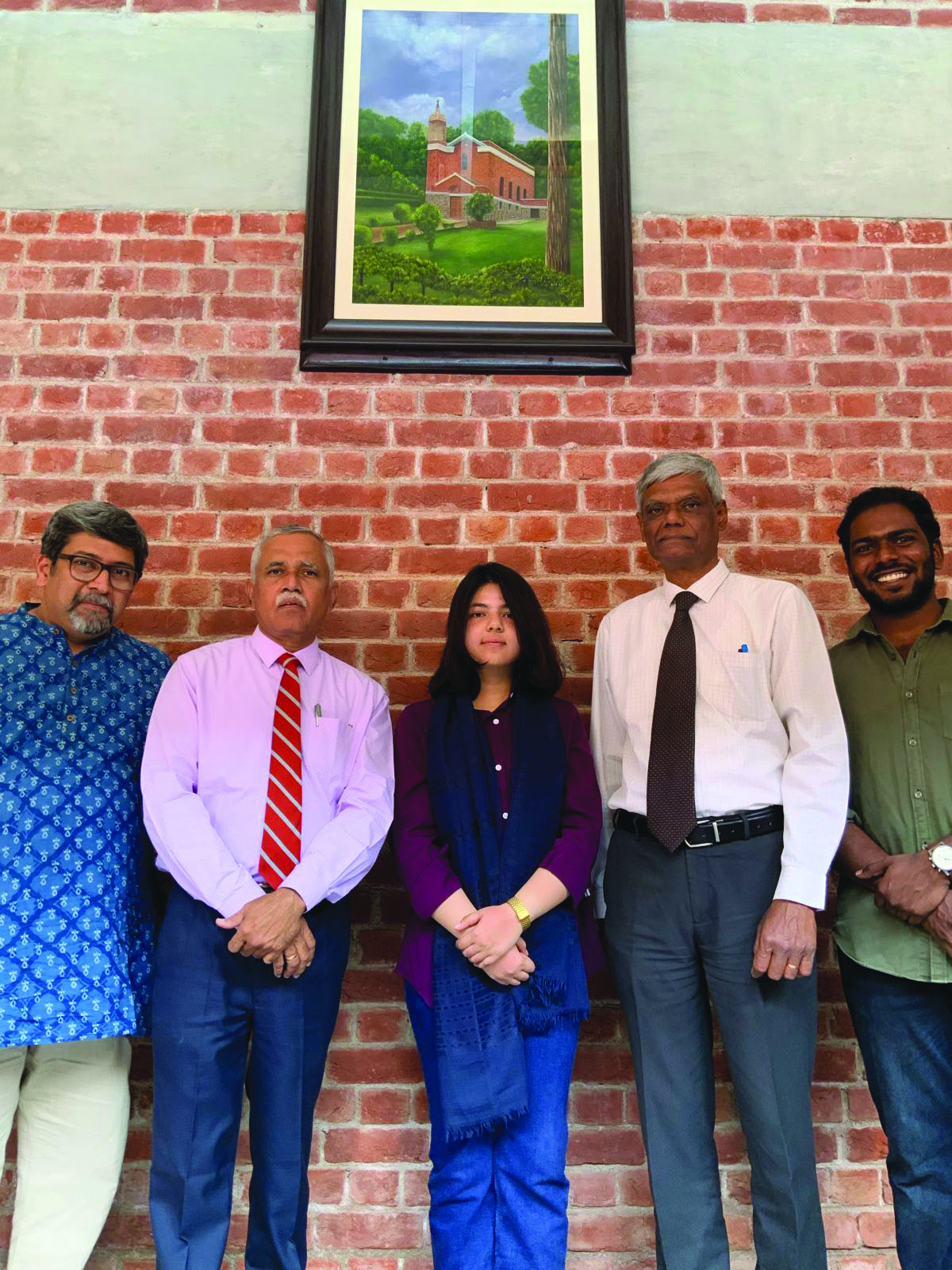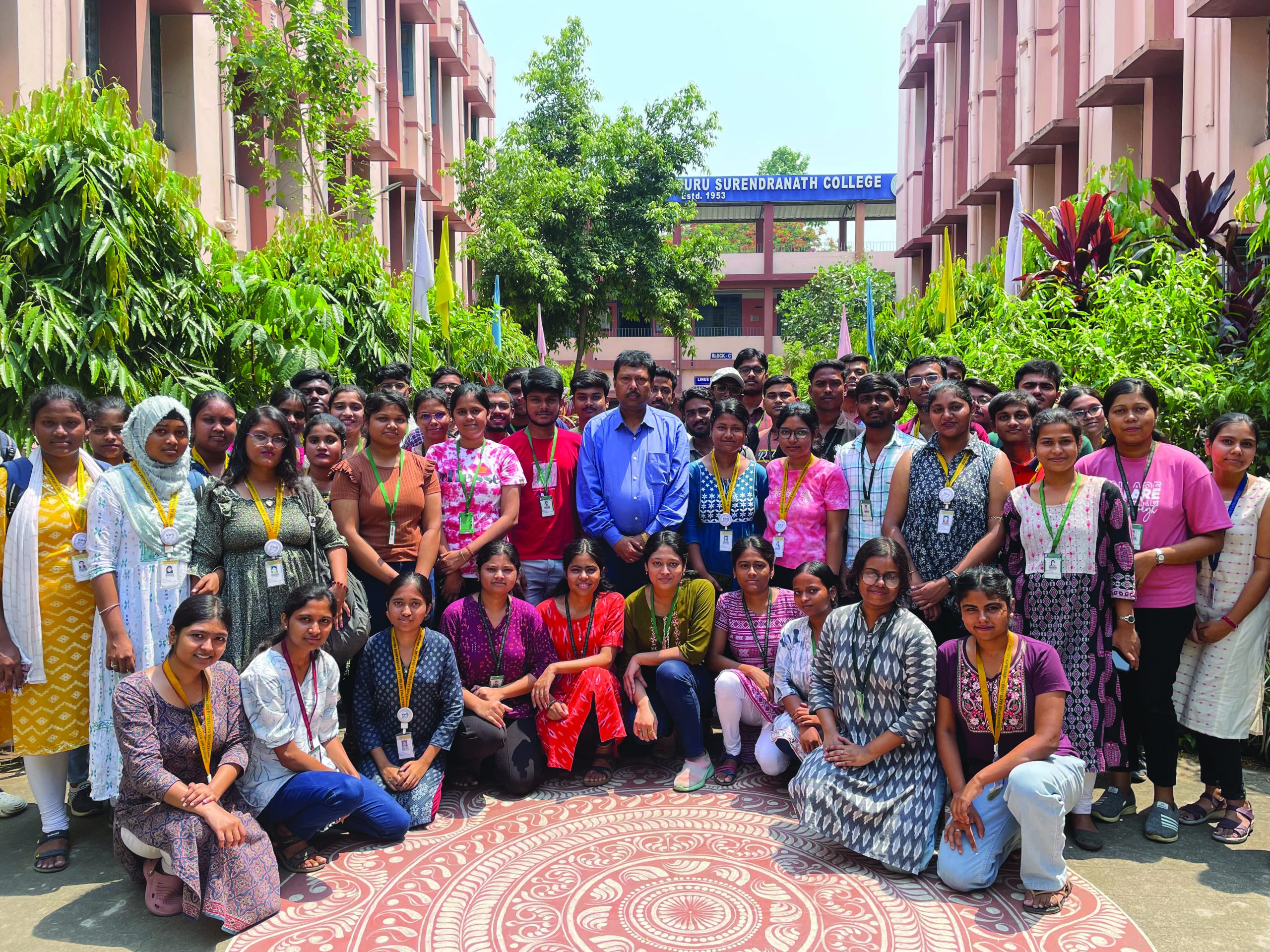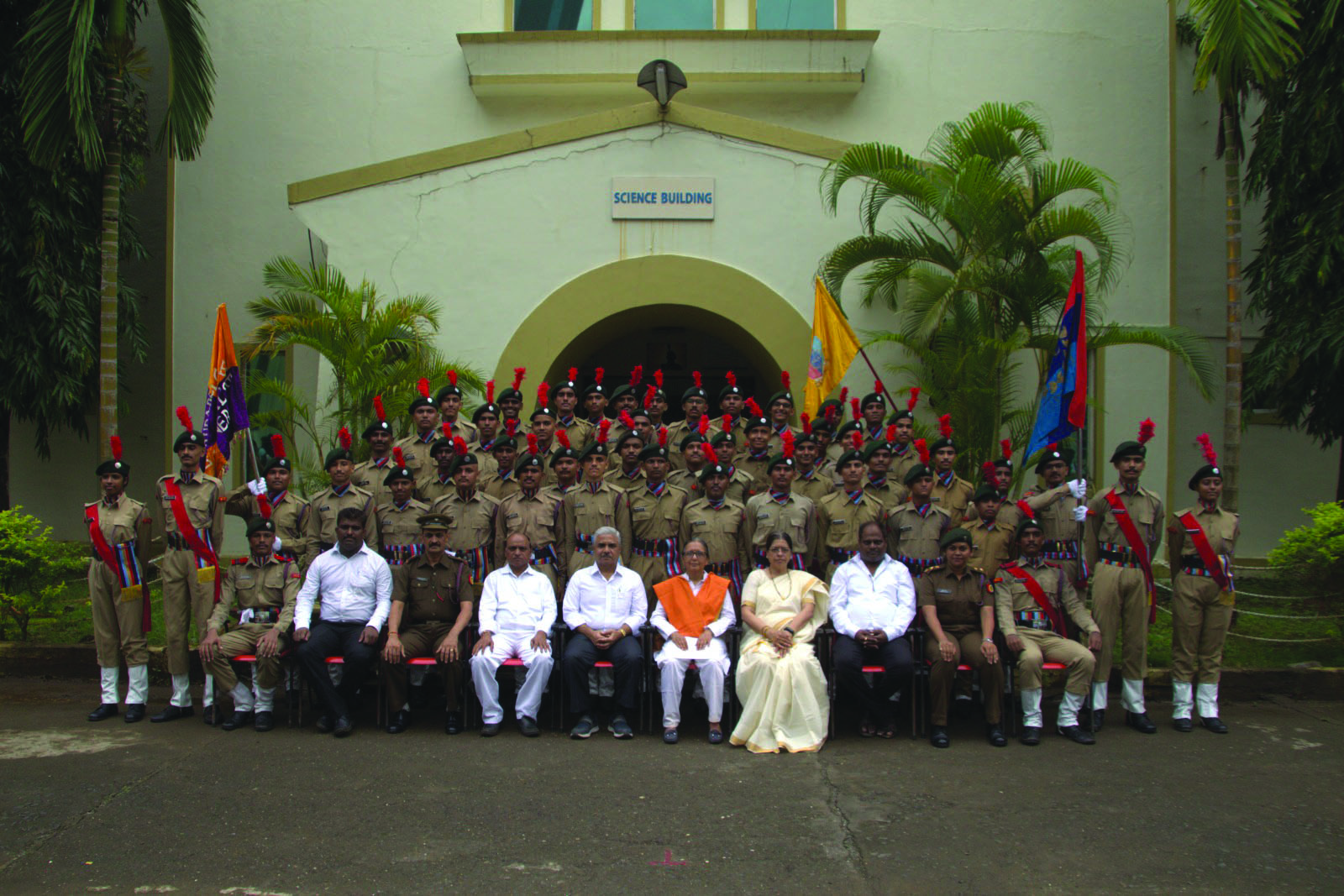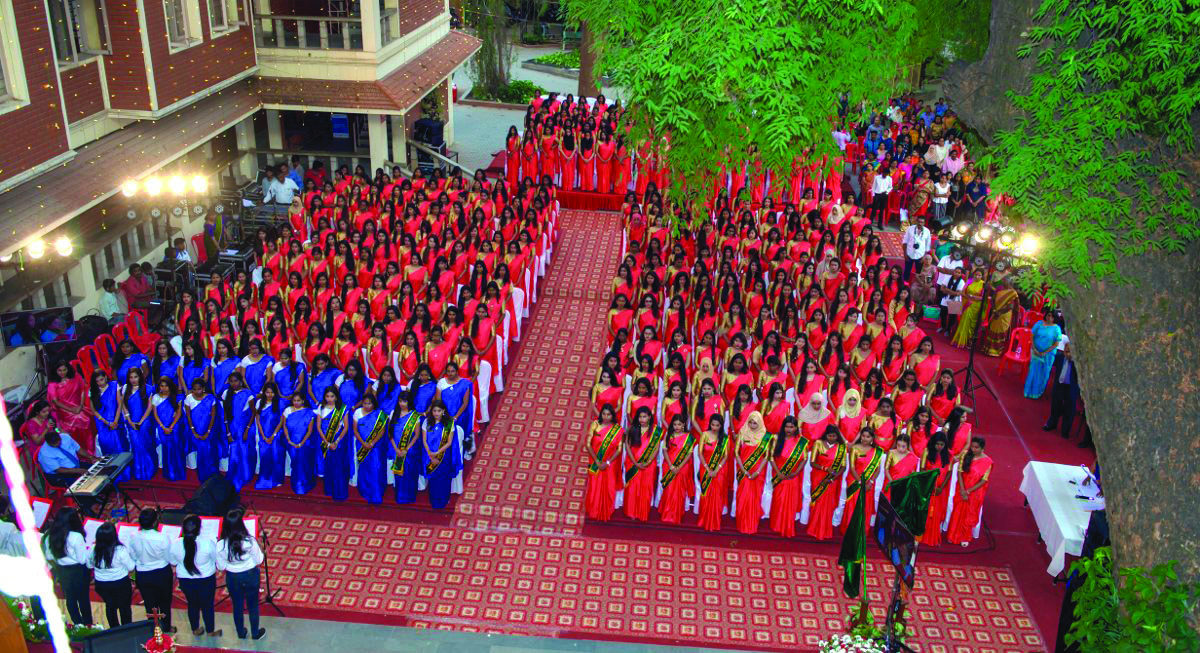Under India’s complex control-and-command higher education system, only 1,222 of India’s 47,000 colleges have been awarded autonomous status. Nevertheless, several non-autonomous colleges continue to be highly ranked and respected

St. Stephen’s John Varghese (centre left): positive factors combination
Ab initio since the annual EducationWorld India Higher Education Rankings were introduced in 2013 to enable parents/school-leavers to identify India’s best colleges and universities, St. Stephen’s, Delhi (estb.1881) has been voted India’s #1 Arts, Science and Commerce (ASC) college.
Unsurprisingly, this vintage college’s numero uno position has remained unaffected after 2020 when your editors segregated ASC colleges into Private Autonomous, Government Autonomous and Private Non-autonomous categories for ranking purposes (to eliminate apples with oranges type comparisons). In the separate league table of Private non-autonomous ASC colleges. St. Stephen’s, Delhi is again ranked #1 with a total score of 633. That’s higher than the total score awarded to St. Xavier’s, Mumbai (602), ranked India’s #1 Private Autonomous ASC College and the Government Degree College for Women, Begumpet, Telangana (525), ranked #1 Government Autonomous College.
It’s an indictment of the country’s complex, control-and-command higher education system that despite its excellent reputation for academics and administration, St. Stephen’s has not been granted autonomous status for which it applied six years ago. This despite the National Education Policy (NEP) 2020 explicitly recommending that excellent colleges should be awarded autonomy and encouraged to transform into self-administered multi-disciplinary degrees-awarding universities in their own right. Moreover, UGC rules state that colleges of more than ten years vintage and awarded minimum Grade A rating by the NAAC (National Assessment and Accreditation Council) are eligible for autonomous status. St. Stephen’s has had NACC A++ grading for several years.
Evidently, Delhi University and Union education ministry officials, who control St. Stephen’s, are reluctant to surrender their powers of patronage over India’s #1 undergraduate college which provides finest higher ASC education at heavily subsidised tuition (and residential accommodation) prices. Under the status quo, their powers of patronage are massive. Therefore, Stephen’s continues to remain a Christian minority private non-autonomous college tied to the apron strings of Delhi University — a Central government-funded institution. Several nationally acclaimed ASC undergrad colleges, all eligible for autonomous status including Miranda House, Sri Ram College of Commerce, Lady Shri Ram College, Hindu College, Sri Ventakaswara College — all affiliated with Delhi University — are in the same boat.
Indeed of the country’s Top 10 private non-autonomous ASC colleges, nine are affiliated with Delhi University (DU) because of heavy subsidization of the varsity by the Central government. In the Union Budget 2025-26, Rs.16,146 crore has been allocated for Central government universities (apart from IITs and NITs). An estimated 50 percent of this amount is for Delhi University (DU) and its constituent colleges enabling them to provide excellent infrastructure and faculty at rock-bottom tuition fees to mainly urban middle class students. For several years, EducationWorld has been advocating means-tested, targeted — instead of universally prescribed — tuition fees in higher education which would increase the income flow of affiliated colleges and free government resources for public primary/secondary education. Alas, to no avail.
Nevertheless despite not having been granted autonomy and rights of self-administration, Prof. John Varghese, Principal of the top ranked St. Stephen’s College, derives comfort that differing sample respondents of “high credibility” have ranked this institution India’s #1 private non-autonomous ASC college for five years consecutively.
“Our top scores under the parameters of faculty competence, faculty welfare and development and curriculum and pedagogy are testimony to the high quality of education provided at St. Stephen’s. Our satisfied highly-qualified faculty teaches beyond the curriculum to ensure every student gets globally comparable undergrad education. This combination of factors adds up to make St. Stephen’s #1. Our graduates shine in every area of human endeavour — the arts, business, NGOs, bureaucracy, education, you name it. Someone from St. Stephen’s is making a positive difference somewhere,” says Varghese, an alum of Loyola College, Chennai and English and Foreign Languages University, Hyderabad appointed principal of St. Stephen’s in 2016. Currently, this college has 1,247 students on its muster roll.

BRSC, Kolkata’s Dr. Monojit Ray (centre): five years #1 in West Bengal
With Delhi University’s big budget enabling it to provide excellent infrastructure that attracts highest quality faculty, DU’s affiliated colleges dominate the Top 10 league table of ASC colleges. In the EW 2025-26 Top 10 league table of private non-autonomous ASC colleges, only two from beyond Delhi — Barrackpore Rastraguru Surendranath College (BRSC), Kolkata, ranked #9 nationally and #1 in West Bengal, and University College of Arts & Sciences, Hyderabad ranked #10 and #1 in south India — are included.
Dr. (Prof.) Monojit Ray, Principal and Controller of Examinations at BRSC, Kolkata which hosts 5,250 students mentored by 145 faculty, is very pleased that BRSC has retained its #9 rank of 2024-25, and particularly its #1 rank in West Bengal (pop.109 million).
“It’s very encouraging that BRSC has been ranked in the national Top 10 and #1 in Bengal for the past five years. This is proof that we have attained and retained high standards. I am especially pleased with our good scores under the parameters of competence of faculty, curriculum and pedagogy, and infrastructure. This indicates that our high quality and motivated faculty engagingly provides well-developed curriculums in a higher education institution with supportive, enabling infrastructure. Our goal is to provide students an all-round education experience that will transform them into good citizens,” says Ray, an alum of the Ramakrishna Mission Vivekananda Central College and Western Calcutta University who served a long stint as faculty with the Navdeep Vidya Sagar College, Kolkata (1999-2016) prior to being appointed principal of BRSC.
Beyond the Top 10 and within the Top 20, the status quo has been largely maintained in the EW league table 2025-26 of India’s 136 most reputed private non-autonomous ASC colleges. The exceptions are Maitreyi College, Delhi promoted to #11 from #15 in 2024-25 and the D.G. Ruparel College of Arts, Science & Commerce, Mumbai which has been awarded a big promotion to #12 (28) by this year’s sample respondents.

DG Ruparel College’s Dr. Dilip Maske (centre): close academia-industry linkage
Dr. Dilip Maske, a science postgrad of Shivaji University, Kolhapur with a Ph D in physics from Mumbai University, ascribes Ruparel ASC’s great leap forward in the esteem of the informed public to rising awareness of the college’s beyond the syllabus education. “In Ruparel ASC, we have acknowledged the ground reality that for our students to be admitted into top-ranked institutions for higher study, intense test prep or coaching beyond syllabus and curriculum is necessary. Therefore for the past few years, we have been providing free-of-charge after hours coaching classes within the campus. This has brought excellent results. Last year, ten of our students were admitted into postgrad programs of the country’s top-ranked IITs and an equal number in NITs. Simultaneously for undergrads ready to enter industry, we have developed close linkages and internship programmes with several blue-chip corporates including Cap Gemini and TCS. Situated on a large ten-acre campus in Dadar, in the heart of Mumbai, the country’s industrial and commercial capital, we have availed the opportunity to involve industry leaders with curriculum planning, skilling programmes and providing internships to our students. As a result, Ruparel has acquired a good reputation for certifying industry-ready graduates who quickly start to become productive corporate assets,” says Maske, who signed up with Ruparel ASC in 1990, was appointed Vice Principal in 2009 and promoted to the Principal’s office in 2020. Currently, Ruparel ASC has 4,200 students and 116 full-time faculty supplemented by 42 visiting faculty from industry, on its muster rolls.
Beyond the Top 12, a few private non-autonomous colleges have risen in the esteem of this year’s sample respondents. Among them Patrician College of Arts & Science, Chennai which has risen steadily in this league table during the past five years from #30 in 2020-21 to #15 (cf. #18 in 2024-25); Arya Mahila PG College, Varanasi to #17 (20) and the previously unranked Ayurvedic & Unani Tibbia College, University of Delhi to #23.

Graduating students of Bishop Cotton Women’s College, Bengaluru
It’s pertinent to note that the 136 private non autonomous colleges included in the EW league table are the most respected of the 45,778 private non-autonomous colleges countrywide. Moreover it’s also noteworthy that colleges that may be modestly ranked in the national league table, are likely to be highly ranked in their host states and cities. For instance, Bishop Cotton Women’s College, Bengaluru, ranked India #14 (15) is #1 in the southern state of Karnataka (pop. 65 million) in this category. Likewise DAV College, Jalandhar ranked India #20 (19) is #1 in Punjab (pop. 31 million), and Sunbeam Women’s College, Varuna, Varanasi ranked India #34 (35) is the #2 private non-autonomous ASC college in Uttar Pradesh (pop. 215 million).
Readers should also bear in mind that non-autonomous ASC colleges are obliged to follow the syllabuses and curriculums set by their affiliating universities which may level them down. Moreover, the national league table is of limited value to day scholars and school-leavers who prefer not to venture further afield for undergrad study. For such students, state and city rankings are of greater import.
Also read: EWIHER Top 500 Arts, Science & Commerce Colleges Rankings 2025-26























